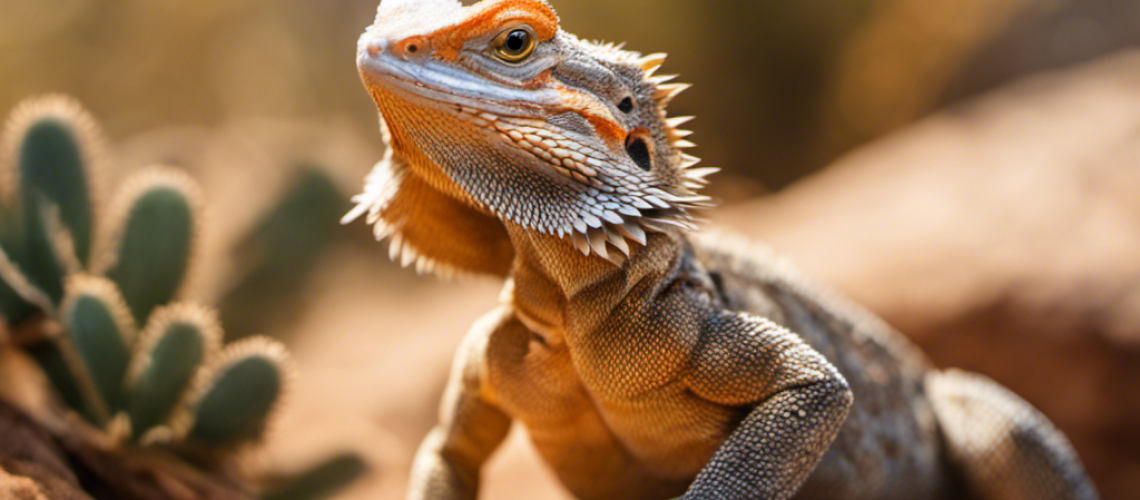Bearded dragons are a popular pet for many people around the world.
Open mouth behavior is frequently observed in these reptiles, leading to questions about what could be causing it.
In this article, we will explore the common causes of open mouth behaviors in bearded dragons.
We will delve into the environmental factors that could contribute to this behavior.
We will also examine potential health issues that may be causing the open mouth behavior.
Additionally, we will discuss the role of diet and nutrition in a bearded dragon’s behavior.
Finally, we will provide guidance on when it is necessary to seek professional advice for this issue.
Key Takeaways
- Open mouth behavior in bearded dragons can be caused by environmental stressors, internal health issues, and distress due to heat, humidity levels, improper nutrition, dehydration, or illness.
- Lack of frequent interaction with keepers and other reptiles, as well as improper light exposure levels, can contribute to open mouth behaviors in bearded dragons.
- It is important to maintain proper environmental conditions, provide socialization and stress reduction, and offer relaxation opportunities to promote the overall well-being of bearded dragons.
- Maintaining appropriate temperature range, observing signs of distress or illness, and ensuring proper diet and nutrition are essential for preventing open mouth behavior in bearded dragons.
Common Causes of Open Mouth Behaviors
Common causes of open mouth behaviors in bearded dragons include:
- Environmental stressors
- Internal health issues
Open-mouth can be a sign of the dragon trying to:
- Regulate its body temperature
- Socialize with other dragons
It can also be an indicator that the animal is in distress due to:
- Heat
- Humidity levels
- Improper nutrition
- Dehydration
- Illness
It’s important to observe your pet for any unusual behavior associated with open-mouth and take action accordingly.
Examining Environmental Factors
Environmental factors may influence a reptile’s behaviors. One such factor is the level of socialization with its keeper as well as other reptiles. The lack of frequent interaction can cause stress and lead to open mouth behavior.
Additionally, light exposure levels both day and night can affect the reptile’s natural circadian rhythm, causing it distress and resulting in an open-mouth response.
Proper environmental conditions are essential for proper reptile health and wellbeing.
Exploring Health Issues
Health issues can arise in reptiles due to a variety of causes. Bearded dragons, for example, may open their mouths when they experience health problems such as an infection or dehydration, or if they are overheated.
Stress reduction and temperature regulation are essential for the maintenance of a healthy bearded dragon. Keeping temperatures in the right range and providing ample opportunity for relaxation can help reduce stress levels and improve overall wellbeing.
Investigating Diet and Nutrition
A proper diet and nutrition are essential for maintaining the health of bearded dragons. To ensure optimal health, owners should be mindful of these three items:
- Cleaning habits: keep the enclosure clean to prevent infections and parasites.
- Supplementing diet: provide variety in their food with fruits, vegetables, and insects.
- Adequate nutrition: provide calcium, vitamins, minerals, and fiber to boost immunity.
Seeking Professional Advice
Seeking professional advice regarding diet and nutrition is a beneficial practice for bearded dragon owners. Veterinarians can provide insight into what should be included in their diet, as well as any potential health problems that could be causing the open mouth behavior.
Consulting with an experienced veterinarian is also important for providing social interaction and stress relief to the animal, both of which can also have an effect on the dragon’s behavior.
Frequently Asked Questions
How Often Should I Bathe My Bearded Dragon?
Bearded dragons should be bathed twice a week in water that is approximately 80-90°F. The bathing frequency and temperature of the water are important for maintaining optimal health. It helps to keep their skin moist, aids with digestion, and removes dirt and debris.
How Do I Know When My Bearded Dragon Is Too Cold or Too Hot?
Bearded dragons require optimal temperatures to remain healthy. To ensure your beardie is not too cold or hot, monitor their bathing temperature and be mindful of the lighting they are exposed to. Maintaining an environment that provides proper warmth and lighting will help keep them comfortable and healthy.
What Kind of Lighting Do Bearded Dragons Need?
Bearded dragons require special lighting that produces the UVB spectrum. This allows them to properly absorb calcium and Vitamin D3, which is crucial for their health. The light should be placed within 12 inches of the dragon and changed every 6 months.
How Do I Know if My Bearded Dragon Is Getting Enough Calcium?
Monitoring your bearded dragon’s calcium levels is important to ensure proper health and development. Appropriate bathing frequency should also be maintained to promote healthy skin and scales. Regular assessments of calcium levels can be done through blood tests or fecal analysis. If results are lower than normal, supplementing with additional calcium may be necessary.
What Kind of Food Should I Feed My Bearded Dragon?
Meal planning for a bearded dragon should include a variety of fresh vegetables and quality commercial diets designed specifically for reptiles. Enclosure setup should provide areas to bask in the sun and hide, as well as adequate space to move about. Quality nutrition is essential for optimal health and wellbeing.
Conclusion
Bearded dragons may exhibit open mouth behaviors for a variety of reasons, ranging from environmental factors to health issues. It is important to examine the animal’s surroundings and diet to identify any potential causes.
If the behavior persists, consulting with a professional veterinarian is recommended in order to diagnose and treat any underlying issues. With patience and understanding, owners can help ensure their bearded dragon remains happy and healthy.






